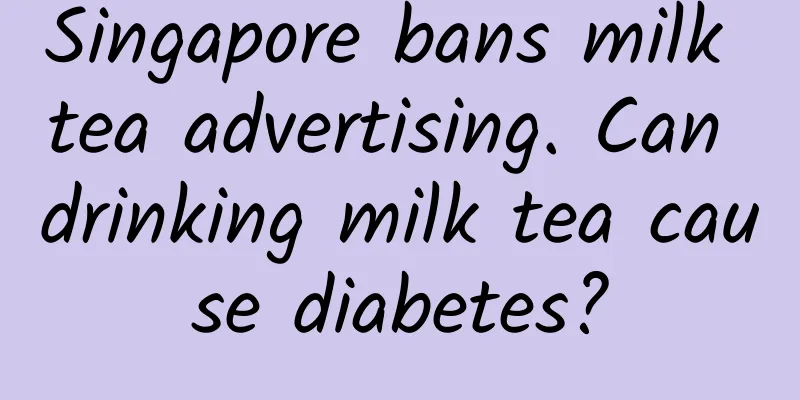Singapore bans milk tea advertising. Can drinking milk tea cause diabetes?

|
Before answering this question, let's take a look at the number of diabetes patients in Singapore: there are more than 400,000 diabetes patients, which means that one in every nine Singaporeans suffers from the disease. According to the diabetes survey data released by the IDF (International Diabetes Federation) in 2019, there are about 600 million diabetes patients worldwide, which means that one in every 10 people suffers from the disease . Looking at this data alone, the incidence of diabetes in Singapore seems to be slightly higher than the world average, but we must also see that the incidence of diabetes in the world is indeed quite high. Let’s get back to the topic. Will drinking milk tea cause diabetes? Many people's first reaction is that there must be a connection, because news such as "22-year-old woman was admitted to ICU due to long-term excessive drinking of milk tea" and "29-year-old girl was diagnosed with fulminant diabetes due to drinking milk tea" have repeatedly become hot searches. The media's hype and the spread in the "Loving Family" group have made the idea that "drinking milk tea will lead to severe diabetes" deeply rooted in the minds of many ordinary people (especially parents). In fact, it is unrealistic to say that "anything is harmful without considering the dosage". Milk tea does contain sugar, but drinking a cup occasionally is definitely different from drinking a cup every day for a long time . I say this mainly to tell those friends who are nagged by their parents that they will get diabetes if they drink a cup of milk tea occasionally, don't worry, after all, you need a cup of milk tea occasionally when you are emo. Let’s get back to the topic. Is drinking milk tea for a long time dangerous to life, or will drinking milk tea for a long time make you more likely to get diabetes? First of all, those people who have become trending topics at a young age because of developing acute diabetes due to drinking milk tea, most of their diabetes is type 1 diabetes, which has little to do with milk tea. To put it simply, diabetes means that insulin cannot control blood sugar in the body within a normal range. There are two situations in which insulin does not work well: either the pancreas stops working and the insulin is gone, which is type 1 diabetes, or the insulin is not so effective, which means insulin resistance occurs, which is type 2 diabetes. Type 1 diabetes often occurs at a younger age, and those in the hot searches are often in their 20s. The sudden onset of the disease is a new subtype of type 1 diabetes - fulminant diabetes. The cause of type 1 diabetes is not yet clear, and it may be related to genetics, autoimmunity and other factors, but it has little to do with your drinking of milk tea. Since type 1 diabetes is mostly related to genetics, autoimmunity and other factors, will long-term excessive consumption of milk tea lead to the occurrence of type 2 diabetes? First of all, type 2 diabetes is indeed related to lifestyle habits. As early as 2013, a study showed that although it cannot be directly said that long-term excessive sugar intake will lead to type 2 diabetes, there is a significant correlation between the two. Even if confounding factors such as exercise and obesity are removed, excessive sugar intake will still increase the risk of diabetes. When there is excess sugar in the body, our pancreas will secrete insulin. If we stay in such an environment for a long time, the pressure on the pancreas will increase significantly, which is not conducive to the long-term use of the pancreas. Secondly, a cup of milk tea a day or long-term excessive sugar intake can easily lead to another problem that you don’t want to face but have to face: obesity. Don’t underestimate obesity. Obese patients are more likely to develop insulin resistance. In other words, although your pancreas still secretes insulin normally, the effect of insulin is not good, which can easily lead to diabetes. Therefore, Singapore’s ban on advertising of beverages such as milk tea and juice may not be very meaningful for those who drink a cup occasionally, but we still have to advise those who eat a high-sugar and high-fat diet every day to develop a good eating habit. Long-term intake of high-sugar and high-fat foods will not only increase the burden on the body and increase weight, but also easily lead to insulin resistance. Although milk tea tastes good, don’t drink too much! |
<<: One picture to understand | Are left-handed people more likely to become artists?
>>: How do we know the age of Sanxingdui artifacts since there are no written records?
Recommend
SEM promotion from word selection to optimization, 3 major routines!
In SEM advertising, we often spend most of our ti...
Which one is better, Youqianhua or 360 IOU?
Recently a friend asked me which one is better, Y...
Can black and white color ultrasound still be called color ultrasound?
Produced by: Science Popularization China Author:...
Bloating, burping, bad breath... don't ignore it, your stomach is telling you
Audit expert: Wu Xinsheng Deputy Chief Physician,...
Free Qianjiang Road Investment Course
The course lecturers are researchers and fund mana...
Competition in mobile phone processors escalates: Huawei HiSilicon's eight-core processor emerges
The mobile phone chip industry is undergoing a new...
Event Promotion: How to create a hit event?
This chapter will take the recent mini program fi...
Over one million new users in half a year, activation cost less than 2 yuan, how did I achieve it through QQ space large account promotion
Friends who do promotion should all have this fee...
These domineering jungle "hermits" coiled in the trees are beautiful and dangerous
In the emerald forest kingdom, there are some uni...
2022 Xiaohongshu user portrait insights and grass-planting analysis
The first part [User Mind Insights] mainly discus...
Osmanthus flowers in Zhejiang bloomed in March? Experts: They may have been "tricked" by the temperature
In March, some netizens discovered that osmanthus...
The latest regulations on the 2022 epidemic: Is the city under lockdown? Can I come and go freely?
Following Shenzhen's stepped-up epidemic prev...
How many "moons" can the Earth have at most?
The Earth is the only celestial body in the known...
How to plan Baidu bidding advertising?
Doing Baidu search promotion (bidding promotion) ...
Jiucheng and Faraday Future signed a joint venture agreement to invest US$600 million
On the morning of March 25, Internet company The9...



![[Popular Science of Chinese Military Technology] What was the first “hidden killer” planted by humans in space like?](/upload/images/67f23414909c3.webp)





